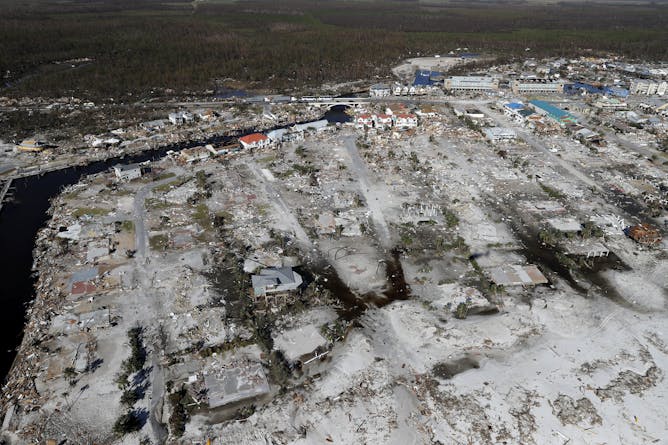|
|
|
Editor's note
|
|
Yesterday President Donald Trump admitted he believes Saudi Arabian journalist Jamal Khashoggi is dead. “That’s based on everything — intelligence coming from every side,” the president said, according to The New York Times. But earlier this week, Trump claimed that he can’t threaten to stop selling Saudi Arabia U.S. tanks and warplanes because it would be like “punishing ourselves.” Trump’s analysis is flat wrong, argues Terrence Guay, an expert on the global defense industry at Pennsylvania State University. In fact, he explains, the U.S. has far more leverage than Trump realizes.
As communities in the South assess the damage from hurricanes Florence and Matthew, some may decide to buy and raze homes that have been damaged repeatedly by floods. Paying people to move out of harm’s way is an important tool for reducing risk, but when lawyer and scientist A.R. Siders reviewed past buyouts, she found that they took a long time and didn’t always make people safer.
And a new survey of young people done by the CIRCLE center at Tufts shows that Generation Z is extremely cynical about politics, but still may turn out to vote in the midterms in greater numbers than expected.
|
Bryan Keogh
Economics + Business Editor
|

|
|
Top stories
|

American-made F-15 warplanes fly over Riyadh.
AP Photo/Hassan Ammar
Terrence Guay, Pennsylvania State University
Trump claimed that 'we would be punishing ourselves' by using US arms sales to Saudi Arabia as a bargaining chip over the disappearance of Khashoggi. A look at the arms trade shows why he's wrong.
|

Devastation from Hurricane Michael in Mexico Beach, Florida, Oct. 12, 2018. Residents whose homes have suffered major damage in multiple storms could eventually be offered buyouts, but the process can take several years.
AP Photo/Gerald Herbert
A.R. Siders, Harvard University
Government agencies spend millions of dollars yearly to buy and demolish homes sited in floodplains. But the program is slow, cumbersome and doesn't always help those who need it most.
|

National School Walkout to honor Parkland victims.
Reuters/Rick Wilking
Kei Kawashima-Ginsberg, Tufts University
A survey shows the newest generation on the voting block is extremely cynical, and that's actually driving high levels of political engagement.
|
|
|
Science + Technology
|
-
Marisa Eisenberg, University of Michigan; Andrew Brouwer, University of Michigan; Joseph Eisenberg, University of Michigan
Polio can be circulating through a community long before anyone is paralyzed. Monitoring sewage for the virus lets public health officials short-circuit this 'silent transmission.'
-
Ana Santos Rutschman, Saint Louis University
Artificial intelligence poses opportunities as well as dangers; understanding them – and regulating carefully – will help avoid harm to individuals and society as a whole.
|
|
|
|
Environment + Energy
|
-
Amitrajeet A. Batabyal, Rochester Institute of Technology
Explaining how carbon taxes and cap-and-trade systems work is simpler than figuring out how high those taxes and caps should be.
-
Leah Gerber, Arizona State University; Timothy Male, Arizona State University
How should the US spend limited funds for conserving endangered species? A new data tool lets managers compare different strategies so they can allocate money to protect the most species.
|
|
|
|
From our international editions
|
-
Yu-Shan Wu, University of the Witwatersrand; Chris Alden, London School of Economics and Political Science; Cobus van Staden, South African Institute of International Affairs
Not enough credit is given to the agency African governments have in their dealings with China.
-
Dominic Wilkinson, University of Oxford
You have to draw an ethical line somewhere so if you were vegan, would you still eat avocados?
-
Tiff-Annie Kenny, University of Ottawa
Although nutritious, inexpensive food options do exist for low-income Canadians, whether those foods are easily accessible or feasible has long evaded both nutrition researchers and politicians.
|
|
|
|
| |
| |
|
|
|
|
|
|
|